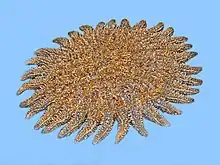Heliaster
Heliaster is a genus of Asteroidea (sea stars) in the family Heliasteridae.[1]
| Heliaster Temporal range: Pliocene to present | |
|---|---|
 | |
| Heliaster microbrachius | |
| Scientific classification | |
| Kingdom: | |
| Phylum: | |
| Class: | |
| Order: | |
| Family: | |
| Genus: | Heliaster Gray, 1840 |
Species
- Heliaster canopus Perrier, 1875
- Heliaster cumingi (Gray, 1840)
- Heliaster helianthus (Lamarck, 1816)
- Heliaster kubiniji Xantus, 1860
- Heliaster microbrachius Xantus, 1860
- Heliaster polybrachius H.L. Clark, 1907
- Heliaster solaris A.H. Clark, 1920
Fossil record
Whole specimens of Heliaster microbrachius have been found preserved in calcite-cemented quartz in Southwest Florida that dates to the Pliocene, 3.5 to 2.5 million years ago (Castilla et al. 2013). Today H. microbrachius is found only in the Pacific Ocean: on the coast of Panama, and Acapulco in Mexico. This suggests that greater connection between the two oceans gave the species a more extensive range in the past (Castilla et al. 2013).
References
- Castilla, Juan Carlos, Sergio A. Navarrete, Tatiana Manzur, and Mario Barahona. 2013. Heliaster helianthus. Chapter 15, pp. 153–160 in John M. Lawrence, ed. 2013. Starfish. Biology and Ecology of the Asteroidea. Johns Hopkins University Press, Baltimore.
- Gray J.E. (1840). A synopsis of the genera and species of the class Hypostoma (Asterias Linnaeus). Annals of the Magazine of Natural History 6: 175-184; 275-290
This article is issued from Wikipedia. The text is licensed under Creative Commons - Attribution - Sharealike. Additional terms may apply for the media files.